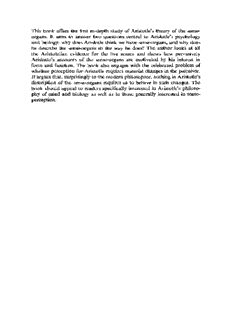
Aristotle on the Sense-Organs PDF
Preview Aristotle on the Sense-Organs
This book offers the first in-depth study of Aristotle's theory of the sense- organs. It aims to answer two questions central to Aristotle's psychology and biology: why does Aristotle think we have sense-organs, and why does he describe the sense-organs in the way he does? The author looks at all the Aristotelian evidence for the five senses and shows how pervasively Aristotle's accounts of the sense-organs are motivated by his interest in form and function. The book also engages with the celebrated problem of whether perception for Aristotle requires material changes in the perceiver. It argues that, surprisingly to the modern philosopher, nothing in Aristotle's description of the sense-organs requires us to believe in such changes. The book should appeal to readers specifically interested in Aristotle's philoso- phy of mind and biology as well as to those generally interested in sense- perception. CAMBRIDGE CLASSICAL STUDIES General Editors M. F. BURNYEAT, M. K. HOPKINS, M. D. REEVE, A. M. SNODGRASS ARISTOTLE ON THE SENSE-ORGANS ARISTOTLE ON THE SENSE-ORGANS T. K. JOHANSEN Lecturer in Classics and Ancient Philosophy University of Bristol CAMBRIDGE UNIVERSITY PRESS CAMBRIDGE UNIVERSITY PRESS Cambridge, New York, Melbourne, Madrid, Cape Town, Singapore, Sao Paulo Cambridge University Press The Edinburgh Building, Cambridge CB2 8RU, UK Published in the United States of America by Cambridge University Press, New York www. Cambridge. org Information on this title: www.cambridge.org/9780521583381 © Faculty of Classics, University of Cambridge 1997 This publication is in copyright. Subject to statutory exception and to the provisions of relevant collective licensing agreements, no reproduction of any part may take place without the written permission of Cambridge University Press. First published 1997 This digitally printed version 2007 A catalogue record for this publication is available from the British Library Library of Congress Cataloguing in Publication data Johansen, T. K. Aristotle on the sense-organs / T. K. Johansen. p. cm. — (Cambridge classical studies) Based on the author's thesis (Ph.D.) - Cambridge University, 1994. Includes bibliographical references and index. ISBN 0 521 58338 1 (hardback) 1. Aristotle. 2. Sense and sensation - History. 3. Perception (Philosophy) - History. I. Title. II. Series. B491.P38J64 1997 121'.35-dc21 96-46730 CIP ISBN 978-0-521-58338-1 hardback ISBN 978-0-521-71473-0 paperback Til mor og far CONTENTS Acknowledgements xiii List of abbreviations of Aristotle's works xv Introduction i i Sight 23 1 The argument 23 2 How to explain the sense-organs 24 3 Explanation from the top down 32 4 The application of top-down explanation to sight 35 5 The composition of the sense-organs in the De Sensu 40 6 Aristotle versus Democritus 44 7 The significance of Aristotle's criticism of Democritus 49 8 Aristotle versus Empedocles and the Timaeus on the kore 51 9 The membrane of the eye 58 10 The poroi of the eye 67 11 Eye colour 95 12 Conclusion 114 2 The medium 116 1 Introduction 116 2 What the medium has to be like if we are going to see the sense-object and not the medium 117 3 What the medium has to be like if there is no perception by direct contact 118 4 The medium as what sense-objects appear through and the medium as a causal link 120 5 Teleological and 'mechanical' explanations 124 ix CONTENTS 6 Can sensible qualities have non-perceptual effects? An argument by Sarah Broadie 128 7 A solution 133 8 Mediation and 'Cambridge' change 136 9 Conclusion 145 3 Hearing 148 1 What is hearing? 148 2 The production of sound 148 3 The mediation of sound 152 4 The sense-organ of hearing 154 5 The composition of the organ of hearing 156 6 How the environment determines the sense-organs 162 7 How a 'mixed environment' determines the sense-organs 165 8 How functions other than perception may determine the sense-organs 168 9 How the available matter may determine the sense-organs 172 10 Conclusion 174 4 The contact senses 178 1 Touch is the sense of direct contact 178 2 Taste is a form of touch 179 3 Two criteria of defining a sense-faculty 179 4 What is flavour? 182 5 Why moisture is not a medium of taste 189 6 The sense-organ of touch 193 7 Flesh as the medium of touch 199 8 Variations in the organ of touch 212 9 The sense-organ of taste 215 10 Variations in the organ of taste 220 11 Conclusion 225 5 Smell 226 1 The difficulty in defining odour 226 2 The analogy between odours and flavours 227 3 The medium of smell 237
